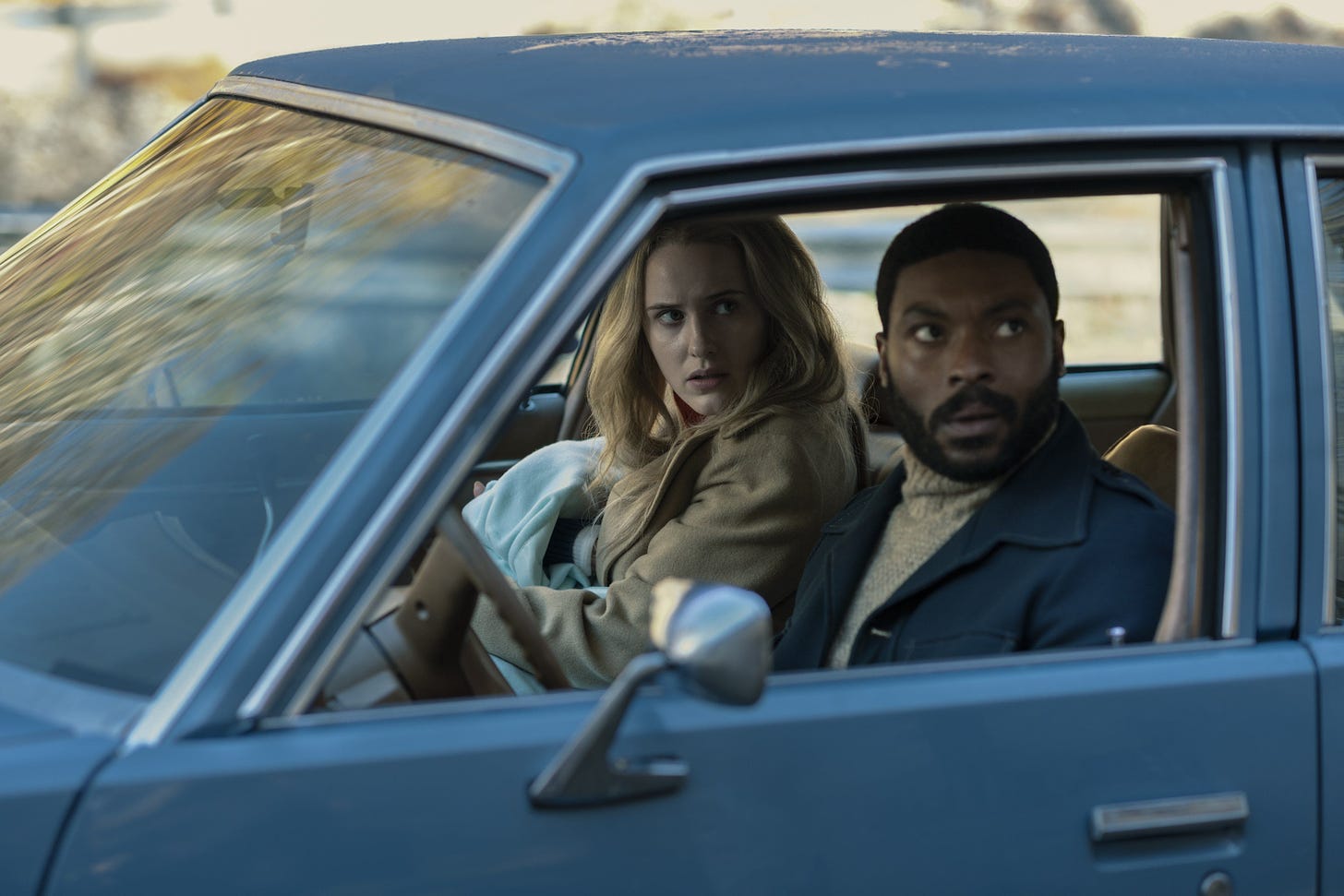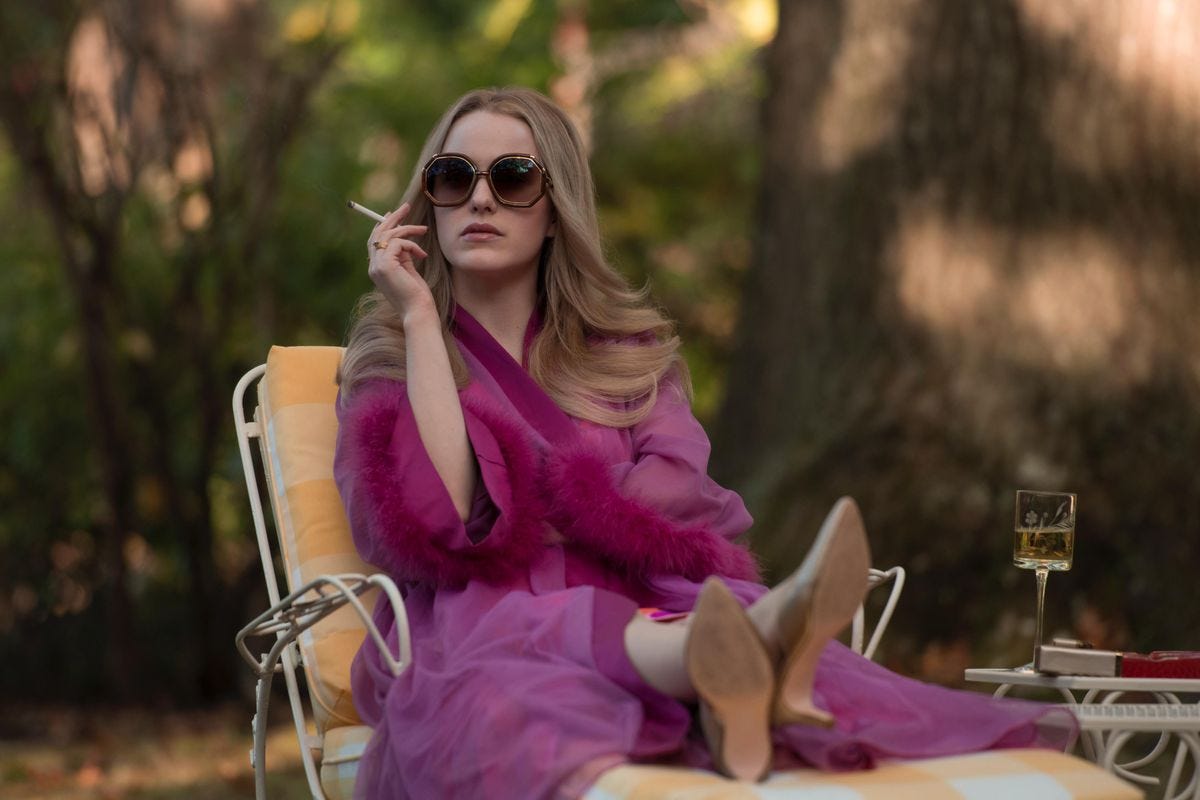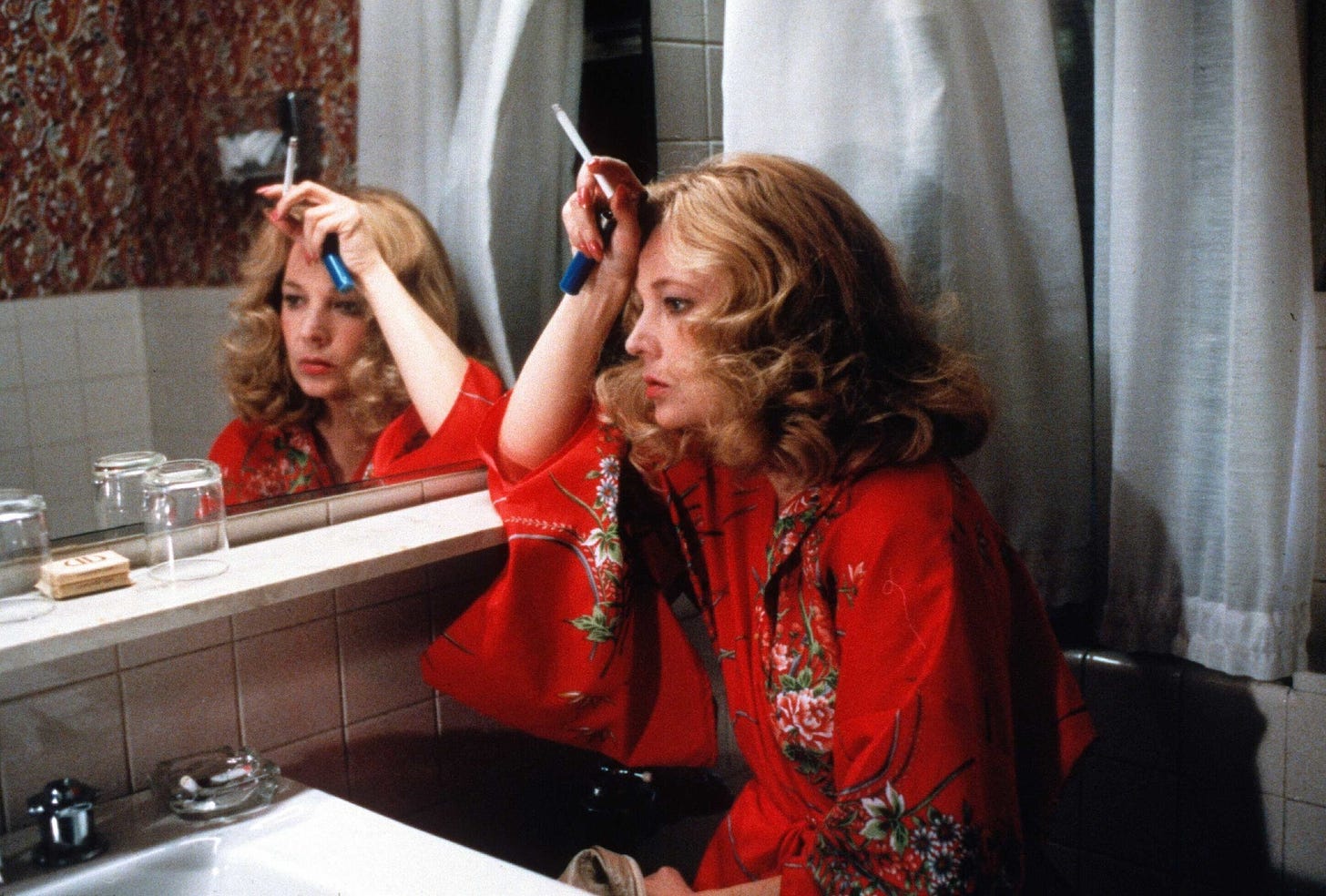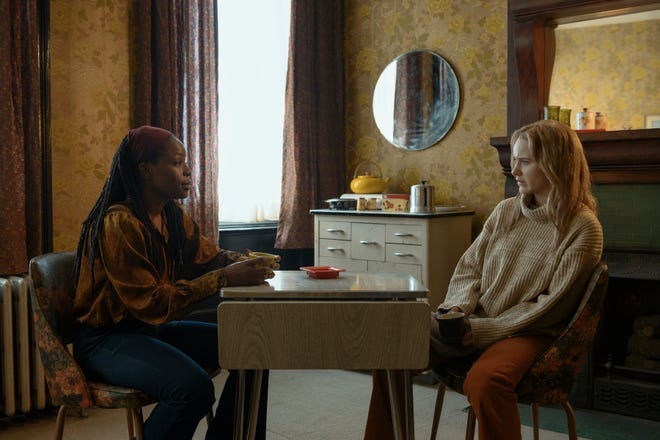I Was Always a Broad
Going on the Lam with John Cassavetes' Gloria and Julia Hart's I'm Your Woman
What does it mean to run away?
At the moment, when there’s nowhere to run, it’s an idea that holds its own forbidden thrill. To those of us yearning for anything outside our own homes, or for a jolt of the unfamiliar, the idea of running away, now more than ever, presents itself as a desperate act. The cinema of running away is made in the vernacular of that desperation; full of transitory places like city bus stops, lonely motel rooms, strangers’ cars, or remote gas stations. These places are the antithesis of home and comfort; they are where you go on your way to somewhere else, liminal and unlovely.
Crime movies are, almost by their nature, good at depicting this sense of impermanence and dislocation. They are populated by desperate men, as a rule; men escaping prisons or jimmying their way into bank vaults, men on the run from the cops or their untrustworthy fellow partners-in-crime. I’m thinking of films like Un Flic (1972), by the French master Jean-Pierre Melville, whose grey expanses of highway and car interiors command a sort of magisterial presence even in their banality. They should be unremarkable, but when characters are going on the lam, these locations become imbued with both terror (you never know if gunmen are lurking around the corner) and possibility. When women find themselves in these situations, the stark contrast between those environments and their usual placement in the genre - ie, in the realms of home and hearth - seems poised for deeper commentary.
I’m Your Woman, Julia Hart’s film about a desperate woman on the run, was released on Amazon Prime only last month, and it begins, at least, in quite the opposite space. Jean (Rachel Brosnahan) swans around a super-seventies suburban pad so gorgeously set-designed you can practically feel the shag rug under your feet. She wears her hair feathery, a la Fawcett, along with a gauzy magenta robe. She’s beautiful, in a beautiful home, and she looks terminally comfortable. This is how the audience is introduced to her, and it’s a smart little con, setting up those of us who are familiar with Brosnahan’s hit show The Marvellous Mrs. Maisel to think we’re re-entering privileged clotheshorse territory, with the home to match. But soon Jean is forcibly sprung from her gilded cage, smuggled out of bed in the midnight hours when one of her husband Eddie’s criminal schemes appears to have come crashing down. Eddie is a career thief, but Jean seems to feel that ignorance is bliss. Until suddenly, it isn’t. Running away isn’t a choice in I’m Your Woman. It isn’t in most crime films, if you want to live. But so many women on the run are seen in the obvious romantic pairs: Bonnie & Clyde, Badlands, True Romance, and the recent Queen and Slim, to name a handful. It’s rarer and more notable that movies give us hunted women who, for one reason or another, have been exiled from the realm of male protection. Floundering and forced to fend for themselves, their vulnerability seems underlined.
And so Jean is thrown into the maelstrom of life on the lam, with no time to pack her things and no idea who might be hunting her down. To further complicate matters, one of Eddie’s latest shady acquisitions is a baby that he has gifted to his wife in the same manner one might hand over a puppy, assuring her that the matter is all taken care of. She and the baby are shepherded into the care of a complete stranger, the quietly watchful Cal (Arinzé Kene), a bodyguard who says he works for Eddie and little more. In spite of Jean’s panicked pleas about what has happened and where her husband is, no one seems to know much, or at least no one seems to want to say it to her. Director Julia Hart wisely matches the audience’s knowledge to Jean’s, with a twisting narrative that can be pungently surprising, often owing to the fact that we’ve been kept in the dark alongside our protagonist.
There’s a moment early in I’m Your Woman where Jean, distracted with a brand new baby on her hip, tries to fry some eggs for her husband and drops one on the floor, burning his toast and making a mess of breakfast. It’s this scene that recalls another, so directly it wouldn’t surprise me if it were direct homage. That scene, too, is of a neatly-coiffed blonde woman in a silky gown who is trying - and failing - to make eggs on a frying pan. This woman is, like Jean, attempting to mother a child who’s not her own, in a dire situation, and about to go on the lam with the kid in tow. The woman is Gena Rowlands, and the film is John Cassavetes’ Gloria (1980.)
In Gloria, the opener is also something of a con. An attractive young Puerto Rican woman with glossy dark hair and long legs is entering an apartment building which seems heavy with the presence of danger. We might assume this film is about her, as she sweats in the summer heat and struggles to reach her apartment in hallways populated by loitering, menacing men. It turns out that her family is marked for execution, after her mob accountant husband has given information to the feds. In the disarray of packing up the family to escape, next-door neighbour Gloria drops by and has their six-year-old boy, Phil (John Adames) foisted upon her for his protection. The film isn’t about this woman at all, but Rowlands’ Gloria. Minutes later, the family is dead, and the swap is striking: Gloria is older, more weathered, unprepossessing and hard-voiced. She has no family to return to, and likes it that way. Off she must go with little Phil dragged along beside her, taking an endless string of cabs, Gloria all the while bickering with the confused young boy and rubbing her blistered feet in pumps. ‘You’re not my mother,’ he shouts at her at one point. To add insult to injury, he says: ‘My mother was beautiful.’ Gloria takes on the role as reluctant adoptive parent, with little choice in the matter; the outcome is a very different sort of family set-up, suggesting a precipitous departure from the past in the form of a tough, teeth-baring, ferociously unmaternal woman.
It’s not merely a show of domestic ineptitude that the two movies share. In many ways, Rowlands’ Gloria and Brosnahan’s Jean are two sides of the same coin. If Jean is all innocence, Gloria is all experience; Jean begins the film in a state of near childlike reliance on her husband, admitting that he didn’t even like for her to drive a car. Gloria, on the other hand, is a former gangsters’ moll. She lives alone with her cat and a gun in the drawer. But by I’m Your Woman’s conclusion, the two seem more alike than different.
So begin two fraught journeys, with these women ejected from their homes and protective bubbles, armed with guns, and made to rely on what they have left to make their way in the world: their wits and their womanhood itself. In Gloria, there are old mob ties that win her an audience with the men who have been hunting them. Gloria doesn’t quite pull off her plea for the mobsters to change their murderous plans, but she does buy herself enough time to make a getaway. She’s chummy and cavalier with the mafia guys, looking around at them sardonically. In one deliciously memorable line reading, she drawls, ‘I know you all approve of mothers. But I was never a mother,’ she pauses; puffs her cigarette for effect: ‘I was always a broad.’
I’m Your Woman is particularly trenchant on the point of womanhood - specifically, white womanhood - being its own source of power. In one nerve-prickling scene, Cal and Jean are approached by a police officer who can’t seem to understand why a white woman and a Black man would be together in a car with a baby. Jean, thinking quickly, claims to be Cal’s wife and makes up a backstory for them, effectively using her white femininity to shield Cal against the racist cop. It’s later flagged again in a terse conversation between Jean and Cal’s wife, Terri (Marsha Stephanie Blake), who tiredly tells Jean: ‘Nothing’s worse for you.’ The fact of the matter is that Jean has been afforded the privilege of not having to think about the realities and hardships of a life of crime, or maybe just of life in general. This is a privilege, or at least a sort of wilful naivete, which comes from her whiteness, and it is not one which is extended to Cal and Terri.
Hart also finds space for tenderness in rare places, like a conversation in a late-night diner between Jean and Cal encapsulating the new, transitory locations of living on the lam. The exchange lays bare the terror Jean feels at the concept of both motherhood and a life which has had the training wheels ripped off. Another mobile location in the film is an isolated cabin in the woods, surrounded by snow, where Jean hides with the baby; by now, a growing sense of self-reliance has taken root. In a scene where she and Terri sit on the front porch in silence, wrapped in blankets and watching the road for intruders, the film briefly looks like something out of a besieged western. With these knowing, hard-bitten women and their flickering, observant gaze, what seemed like vulnerability is beginning to look like something else entirely.
I’m Your Woman is a brilliant deconstruction of elements that so many films of its type tend to take for granted. As Hart has explained in interviews, Eddie would typically be the character a macho 70s crime movie would follow. But what would have happened to his wife and kids? Is there someone out there to survive him and cope with the consequences if he dies in a hail of bullets? We rarely get to see that side of the story. And what’s more, stories like these offer fascinating allegorical prospects, in a genre which typically has not been too interested in exploring female self-actualisation. John Cassavetes is, in Gloria and elsewhere, also excellent at cutting through the lie of male authority and control - with a six-year-old boy’s father assuring him to ‘be a man, and always be tough’. As final words of advice, they don’t exactly fill anyone with confidence.
Criminals create alternative modes of living, existing parallel to the mainstream, operating in their own violent and secretive worlds. They form their own networks and support systems; their own rules and retribution. They can’t relate to the ‘average nobody,’ and live in terror of being ‘like everybody else’, as Henry Hill so disdainfully puts it at the close of Goodfellas. Yet for women, this offers a certain latitude: the norms are evaded, family life is disrupted, and they must remake the rules. For Gloria, that’s with this mouthy little boy who has learned resilience from her (when she’s through with him he’ll probably resemble one of the Dead End Kids, to better avoid all that mushy stuff), and for Jean its with this makeshift group who have taught her to stand on her own two feet, however unsteadily. Women on the lam have shed the old husks of convention and the disappointments of men; they rely on themselves. They adapt.
In a recent interview, Julia Hart said it best when describing her protagonist. ‘She just figures it out. That is the most female thing I could think of.’
~~~~~~~
If you enjoyed this twice-monthly newsletter and would like to subscribe for £5 per month, you can do so below! Thanks for reading.







Cracking stuff! I haven't seen either movie so will look them up. I was put in mind of Pandora's Box though? Lulu being ripped out of her (on the surface at least) glamorous world and dropped into increasingly transitory, dangerous places.